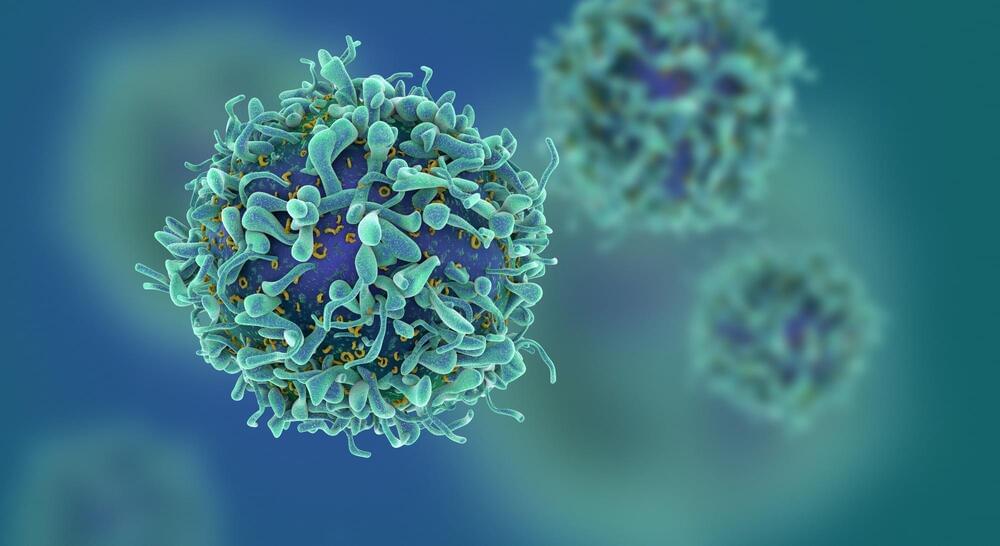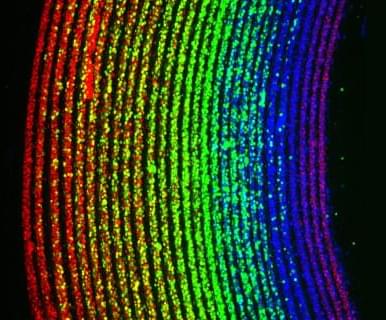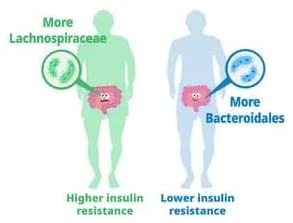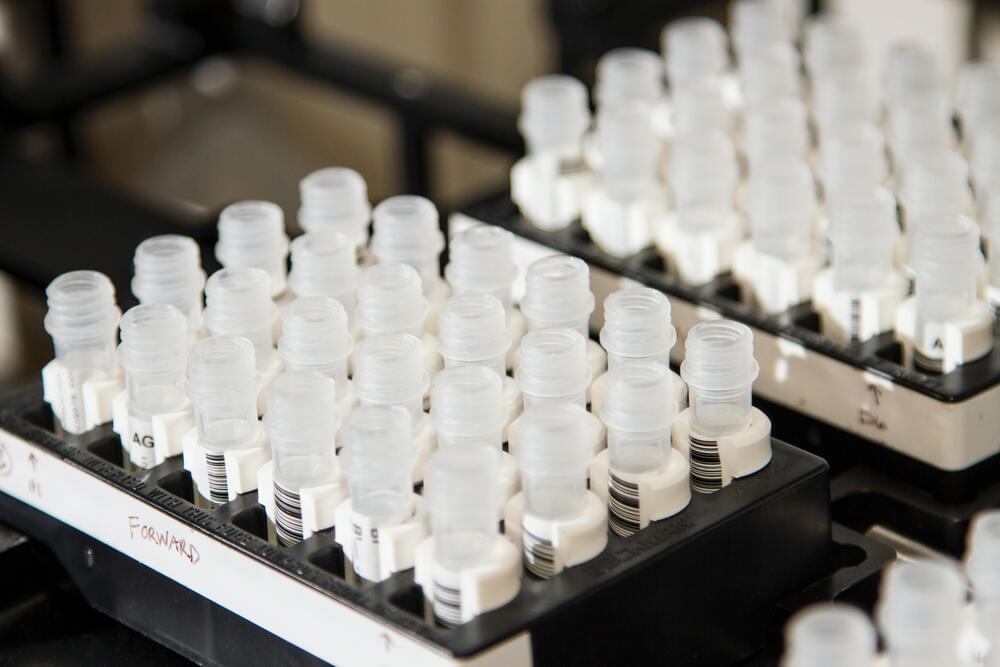Archive for the ‘biotech/medical’ category: Page 305
Sep 2, 2023
Unlocking tumor immune evasion: IL1RL1+ Treg cells and CAFs collaborate for immunotherapy resistance
Posted by Shubham Ghosh Roy in category: biotech/medical
Researchers demonstrated that the crosstalk between IL1RL1+ regulatory T-cells (Treg) and cancer-associated fibroblasts (CAFs) drives the tissue repairing.
Sep 2, 2023
New tech is step towards lab-grown blood vessels
Posted by Dan Kummer in categories: biotech/medical, engineering
Innovative technology that creates ultra-thin layers of human cells in tube-like structures could spur development of lifelike blood vessels and intestines in the lab.
The technique, known as RIFLE – rotational internal flow layer engineering – enables the construction of separate layers as delicate as one cell thick.
Such versatility is crucial to developing accurate human models of layered tubular tissue for use in research, offering an important alternative to animal models, experts say.
Sep 1, 2023
Harvard/MIT Scientists Claim New “Chemical Cocktails” Can Reverse Aging
Posted by Shubham Ghosh Roy in categories: biotech/medical, chemistry, genetics, life extension
That’s why we were struck to see a team of scientists that includes researchers from the name-brand Harvard Medical School and Massachusetts Institute of Technology sounding off about what they say are promising new leads, published this month in the journal Aging.
“We identify six chemical cocktails, which, in less than a week and without compromising cellular identity, restore a youthful genome-wide transcript profile and reverse transcriptomic age,” reads the paper. “Thus, rejuvenation by age reversal can be achieved, not only by genetic, but also chemical means.”
Sounds big, right? The researchers claim they pinpointed six treatments that can reverse aging in cells and turn them into a more “youthful state,” according to a press release from Aging’s publisher, without causing dangerous unregulated cell growth.
Sep 1, 2023
Bacteria treatment reduces insulin resistance, protects against diabetes
Posted by Shubham Ghosh Roy in categories: biotech/medical, genetics
Researchers led by Hiroshi Ohno at the RIKEN Center for Integrative Medical Sciences (IMS) in Japan have discovered a type of gut bacteria that might help improve insulin resistance, and thus protect against the development of obesity and type-2 diabetes. The study, published August 30 in the scientific journal Nature, involved genetic and metabolic analysis of human fecal microbiomes and then corroborating experiments in obese mice.
Insulin is a hormone released by the pancreas in response to blood sugar. Normally, it helps get the sugar into the muscles and liver so that they can use the energy. When someone develops insulin resistance, it means that insulin is prevented from doing its job, and as a result, more sugar stays in their blood and their pancreas continues to make more insulin. Insulin resistance can lead to obesity, pre-diabetes, and full-blown type-2 diabetes.
Our guts contain trillions of bacteria, many of which break down the carbohydrates that we eat when they would otherwise remain undigested. While many have proposed that this phenomenon is related to obesity and pre-diabetes, the facts remain unclear because there are so many different bacteria and there is a lack of metabolic data. Ohno and his team at RIKEN IMS have addressed this lack with their comprehensive study, and in the process, discovered a type of bacteria that might help reduce insulin resistance.
Sep 1, 2023
Single-Incision Laparoscopic Surgery effective for Gastrointestinal Stromal Tumor
Posted by Shubham Ghosh Roy in category: biotech/medical
In a recent study, Ji Won Seo and team found the outcomes of single-incision laparoscopic surgery (SILS) better than conventional laparoscopic surgery (CLS) for treating gastric gastrointestinal stromal tumors (GISTs). The findings of the study were published in BMC Surgery.
Between November 2020 and April 2022, a group of 15 consecutive patients with gastric GIST underwent single-incision gastric wedge resection, forming the SILS group. This group’s early perioperative outcomes were then meticulously analyzed and compared with a corresponding group of 15 patients who had undergone conventional laparoscopic surgery (CLS). The selection criteria for the surgical approach were consistent with those used for traditional laparoscopic procedures for gastric GIST.
The study’s findings revealed several significant insights. The estimated blood loss and intraoperative blood transfusion were comparable between the SILS and CLS groups, signifying similar surgical efficacy and safety. Notably, the SILS group experienced no intraoperative complications or instances requiring a shift to multiple-port or open surgery.
Sep 1, 2023
Stanford Medicine-led study finds genetic factor fends off Alzheimer’s and Parkinson’s
Posted by Shubham Ghosh Roy in categories: biotech/medical, genetics, neuroscience

A massive study of medical and genetic data shows that people with a particular version of a gene involved in immune response had a lower risk of Alzheimer’s and Parkinson’s disease.
Sep 1, 2023
New insights on why epilepsy develops, potential treatments in world’s largest genetic study
Posted by Shubham Ghosh Roy in categories: biotech/medical, genetics, neuroscience
Specific changes in our DNA that increase the risk of developing epilepsy have been discovered, in the largest genetic study of its kind for epilepsy coordinated by the International League Against Epilepsy, which includes scientists from the University of Melbourne and WEHI (Walter and Eliza Hall Institute of Medical Research).
Published today in Nature Genetics, this research advances our understanding of why epilepsy develops and could inform the development of new epilepsy treatments. The research was produced by the International League Against Epilepsy (ILAE) Consortium on Complex Epilepsies.
Epilepsy is a common brain disorder estimated to effect more than 50 million people worldwide, where nerve cell activity in the brain is disturbed, causing seizures. It has a genetic component that sometimes runs in families. In this study, researchers compared the DNA from almost 30,000 people with epilepsy to the DNA of 52,500 people without epilepsy from around the world. The differences between the two groups highlighted areas of DNA that may be involved in the development of epilepsy.
Sep 1, 2023
Biological clocks: How does the body know that time goes by?
Posted by Shubham Ghosh Roy in categories: biotech/medical, health
In April of this year, Spanish athlete Beatriz Flamini emerged into the light after a 500-day stay in a cave. Her descent underground is probably the longest undertaken by a long stretch. Flamini says she lost all sense of time on the 65th day. But can she really be sure it was the 65th day? By way of comparison, in 1962 France’s Michel Siffre surfaced from the Scarasson chasm in Italy after spending what he thought was 33 days there. In fact, he spent 58 days underground.
How can isolated human beings keep regular track of time, even when they’re disconnected from their surrounding environment? Quite simply, because biological rhythms are at the heart of life, regulating it all the way from the molecular level up to that of the entire body. These include not only our sleep/wake cycles, but also body temperature, hormones, metabolism and the cardiovascular system, to name but a few.
And these rhythms have many repercussions, not least in terms of public health. Indeed, a number of diseases are episodic—for example, asthma is more severe at night, while cardiovascular accidents are more frequent in the morning. Another example is shift work, which disconnects people from their environment. It may be associated with an increased risk of cancers in workers, prompting the WHO to label it as a probable carcinogen.
Sep 1, 2023
When is pharmacogenomic testing useful in cancer care?
Posted by Omuterema Akhahenda in categories: biotech/medical, food, genetics
Dr. Kimathi is a medical oncologist in a community setting where she sees patients with a variety of cancer diagnoses. Recently, she had several patients with toxicities to different treatments, including tamoxifen, cisplatin, and methotrexate. Concerned, she wondered if there was a common factor these patients shared to have experienced these toxicities. On review, she found that these patients had different cancer diagnoses and did not share any known comorbidities or risk factors.
Why do some cancer patients experience toxicities from certain treatments and others don’t? Drug metabolism is highly variable among patients, and even within the same patient, depending on age and disease state. Both the toxicity and efficacy of cancer chemotherapy can be affected by many different factors, including other medications, foods, dietary supplements, environmental conditions, and genetic variants in drug-metabolizing genes and drug transporters.

















